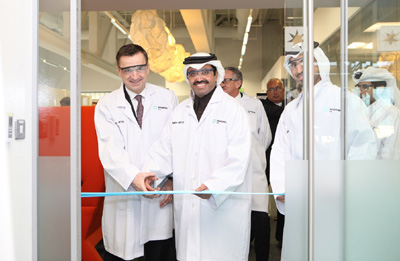
Maersk opens oil research lab in Qatar
Doha, January 19, 2014
Maersk Oil, an international oil and gas company, has announced the official launch of its digital core laboratory in Doha.
The Maersk Oil Digital Core Laboratory - a first of its kind in the Middle East - will support ongoing applied research efforts in the area of enhanced oil recovery (EOR), particularly in carbonate reservoirs such as Qatar’s Al Shaheen oil field, which is one of the most complex in the world.
It is part of a ten-year $100 million investment by Maersk Oil in applied research in Qatar, focusing on improved oil recovery, enhanced oil recovery and the marine environment.
Qatar Minister of Energy and Industry Dr Mohamed Bin Saleh Al-Sada inaugurated the hitech facility at Maersk Oil Research and Technology Centre (MO-RTC) in Doha.
Dr Al-Sada also witnessed the signing of a technology co-operation framework agreement between Qatar Petroleum and Maersk Oil to allowing QP to use the Maersk laboratory for individual or joint research activities.
Speaking at the launch, Dr Al-Sada said: “Qatar has made a commitment to be a leading center for research and development, excellence, and innovation. Therefore, research facilities like this play an important role in fulfilling that goal. We are hopeful that the laboratory and the research findings that it will generate would greatly contribute to the future development of Qatar’s energy industry.”
Maersk Oil CEO Jakob Thomasen said working closely with its partner Qatar Petroleum, Maersk Oil has become specialists in understanding and applying the right technologies to maximize long-term production potential and unlock value from the complex Al Shaheen field.
"By advancing understanding of the mineralogy of Al Shaheen reservoir rocks and of the subsurface chemistry and fluid flow relationship, the laboratory aims to improve enhanced oil recovery success rates," he added.
Researchers at the laboratory will use more than 13,000 X-ray images in a computed tomography (CT) scan to make a mathematical reconstruction of carbonate rock samples.
The pores of oil-bearing rocks are studied at a minute level, down to a diameter of 40 times less than that of a human hair. When these data results are combined, a 3D image is produced that shows valuable petrophysical and flow-related information.
Abdulrahman Al Emadi, the head of MO-RTC, said: “The collaboration agreement builds on Maersk Oil’s close relationship over the past 20 years with Qatar Petroleum, our partner at Al Shaheen, and opens up the Digital Core Laboratory for the greater good of Qatar.’
Dr Nasser Saqer Al-Mohannadi, the manager of Qatar Petroleum’s research and technology centre, described the agreement as a vital step in enhancing its existing relationship with Maersk Oil and its research team at the Qatar Science and Technology Park.-TradeArabia News Service







